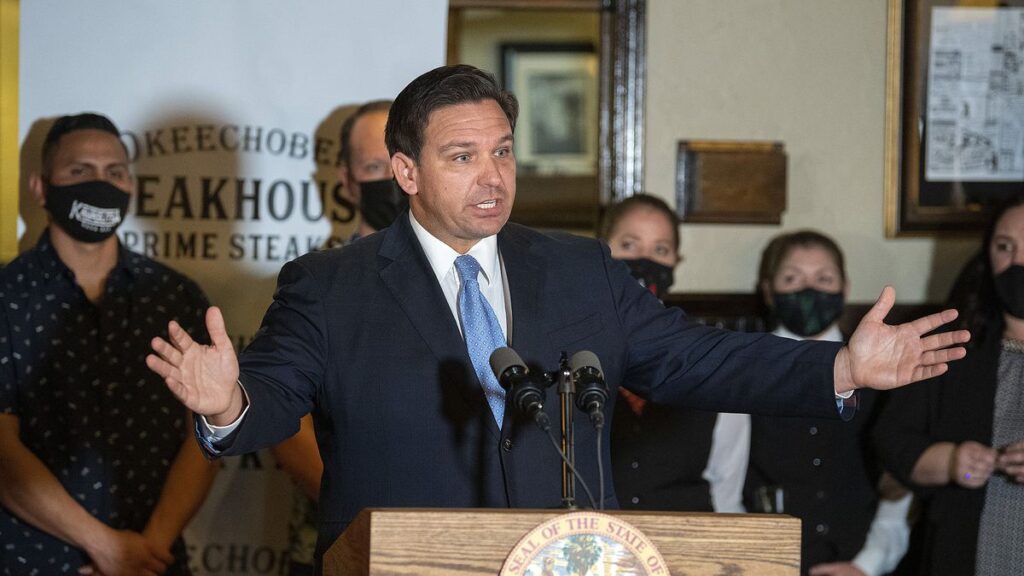Gov. Ron DeSantis delivered a blow to some businesses by vetoing a bill Friday that would have required taxpayers to pay damages if a local government ordinance results in a business losing 15% of its revenues.
“The broad and ambiguous language of the bill will lead to both unintended and unforeseen consequences and costly litigation,” DeSantis wrote in his veto message.
The Measure, SB 620, would have allowed businesses that have been in operation for at least three years to file lawsuits seeking to recover lost profits for up to seven years if they lose revenues as a result of a local ordinance or citizen initiative.
It was one of a series of measures passed in the 2022 session amid the standoffs between DeSantis and more progressive big city governments over mask mandates, COVID-19 shutdowns and other pandemic-related policies.
In recent years, some business groups have turn to the Republican-controlled state Legislature to reverse or prevent local government decisions restricting natural gas hookups, regulating vacation rentals and party houses, banning plastic drinking straws and certain sunscreens, and imposing rules on where utility companies can set up solar farms.
Proponents called SB 620 a “pro-business” bill designed to protect private property rights. Opponents said it would be an expensive burden for taxpayers, encourage frivolous lawsuits, prevent efforts to crack down on such things as puppy mills, regulate bar hours, and to restrict bans on products that harm the environment.
Florida TaxWatch, the business-backed research organization, estimated that the legislation could cost local governments over $900 million annually because it predicted an avalanche of lawsuits could force governments to increase taxes or reduce services to cover legal fees.
But while DeSantis criticized local governments, he suggested the measure went too far.
“Local governments do overstep their authority and unreasonably burden businesses through policies that range from the merely misguided to the politically motivated,” he wrote. “Indeed, this was illustrated by the bizarre and draconian measures adopted by some governments during COVID-19, necessitating the state to overrule these edicts to protect freedom and opportunity for Floridians.”
He added that, “incredibly this bill exempts compensating businesses due to ’emergency’ orders of local government.’”
DeSantis suggested “the better approach is to enact targeted preemption legislation when local governments act in a way that frustrates state policy and/or generals the rights of Floridians.”
Last year, DeSantis signed into law a bill the preempted a decision by Key West residents who voted to ban cruise ships with more than 1,300 passengers from docking at the city ports.
Local officials sought the veto
Local government officials warned that the measure would pit against each other and force taxpayers to foot the bill. They urged DeSantis to veto the legislation.
Get insights into Florida politics
Subscribe to our free Buzz newsletter
Political editor Emily L. Mahoney will send you a rundown on local, state and national politics every coverage Thursday.
You’re all signed up!
Want more of our free, weekly newsletters in your inbox? Let’s get started.
“Although the bill was amended to address some of the concerns with the original language, we fear that the creation of a private cause of action will lead to a countless frivolous lawsuits whenever a local government passes a law perceived as unfavorable to a single entity,’ ‘ wrote Miami-Dade Mayor Daniella Levine Cava in a March 28 letter to DeSantis. “We are also concerned that the volume of lawsuits will further worsen the already litigious climate in Florida and negatively impact taxpayers.”
The veto of SB 620 was the fourth time this year the governor derailed a priority project for Senate President Wilton Simpson, the Trilby businessman who is seeking the Republican nomination for agriculture commissioner.
Simpson used his clout to get the Senate to give fast-track approval to top priority of Florida Power & Light, a measure that would undercut incentives to residential expansion of rooftop solar and allow utilities to impose new fees and costs. But that bill was vetoed by DeSantis who said it would “contribute to the financial crunch that our citizens are experiencing.”
Simpson also attempted to inject into the budget $331 million in agriculture projects he could control if he were elected the next agriculture commissioner, including the addition of new staff. But DeSantis red-lined many of those as part of his $110 million in line-item vetoes in the budget.
And a Simpson-backed bill that would have been given Farmers priority access to water from Lake Okeechobee during a drought also was rejected by DeSantis, who warned that it created “unnecessary and redundant regulatory hurdles” that could compromise the execution of Everglades restoration projects.
Simpson did not respond to requests for comment.
The veto was lauded by advocacy groups who feared the measure would have had a chilling effect on environmental protection.
“This is a clear victory for local leaders and their constituents,” said 1000 Friends of Florida President Paul Owens. Stopping SB 620 was one of the organization’s top priorities this year.

